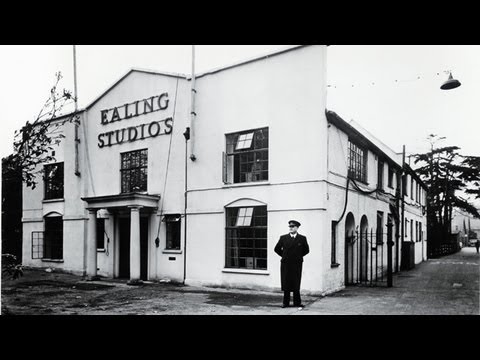Classic British Comedy from Ealing Studios
By Michelle Strozykowski

The London borough of Ealing is home to one of the oldest film studios in the world. Ealing Studios have produced some of Britain's best loved comedy films.
The Golden Years
The golden years of Ealing are generally considered to be the 1940s and 50s, a peak time for British film-making during which Ealing produced such gems as Passport to Pimlico, Kind Hearts and Coronets, School for Scoundrels, The Ladykillers and The Lavender Hill Mob.
Gentle Whimsy
Ealing Studio films demonstrated a comedy of gentle whimsy, squeezing all they could out of British stereotypes. Inept policemen, London buses, cockney spivs, stiff upper lips and lots of drinking tea featured heavily. These films were so very British in their essence, often they were hard to understand elsewhere. Firmly rooted in a time and place, in retrospect they can be viewed not only as classic comedies but as social and political histories of Britain.
Passport to Pimlico
Passport to Pimlico was made in 1948 by director Henry Cornelius. Set just after the end of the second world war, Passport to Pimlico demonstrated a clear understanding of the social climate of the time. To put it in context, after a victorious war the Conservative British Prime Minister Winston Churchill was defeated in the general election by a landslide majority for Labour. Why was he rejected by the British public? They were ready for a change; a revolution for British society; they wanted to shrug off the class system and see equal opportunities for all. This need for change is palpable in Passport to Pimlico, which essentially concerns the story of the residents of Pimlico (another borough of London) discovering a document that reveals they are, legally speaking, living in the land of Burgundy. They immediately decide to seal themselves off from the rest of England and set up their own 'country', complete with new rules and regulations. Problems and comedy ensue when Pimlico is over-run by crooks eager to evade British law, and ultimately the residents realise that good old Blighty is the place they want to be.
This film teaches a great deal about social harmony, all done with the lightest of comedic touches. Talk about a roadmap, Passport to Pimlico really should have been required viewing before Brexit, it would have shown us exactly what to expect!
Kind Hearts and Coronets
Kind Hearts and Coronets (1950) is a masterpiece of film-making and, unlike Passport to Pimlico, doesn't require quite as much awareness of British history in order to grasp what's going on. Directed by Robert Hamer, Kind Hearts and Coronets concerns the snobbish, wealthy D'Ascoyne family. When young Louis Mazzini D'Ascoyne (Dennis Price) discovers that he is ninth in line to inherit the family fortune, he devises a despicable plot to bump off the other eight family members. This is a wicked and wonderful comedy which has great fun following the murderous Mazzini about his dastardly deeds, and revels in finding more and more outrageous ways of offing the hapless D'Ascoynes. One of the major reasons this film is such a hoot is that the entire dynasty of D'Ascoynes (bar Mazzini) are all played by Alec Guinness, even Lady Agatha. This means Guinness gets to camp it up in the most glorious fashion. His performance is off the record good, and Dennis Price and leading lady Joan Greenwood aren't bad either. Together they make Kind Hearts and Coronets unsurpassable.
Ealing in the 21st Century
Sadly the production company known as 'Ealing Studios' passed into decline in the late 1950s, although the studios themselves remained in use by other companies such as the BBC, who bought the lot in 1955. They produced a number of iconic television programmes there such as Z Cars, Porridge and Dr Who. Ealing comedies are no more, but the studios are still in fine fettle. Re-developed as a state of the art studio in 2000 they have had a hand in productions such as Millennium Films' The Hitman's Bodyguard and Working Title's Darkest Hour. TV programmes such as Luther and Downton Abbey have also been made in part at Ealing Studios. Modern productions at Ealing benefit greatly from the incredible history of the studios which retain an almost magical quality that sets them quite apart. Roll on Ealing!